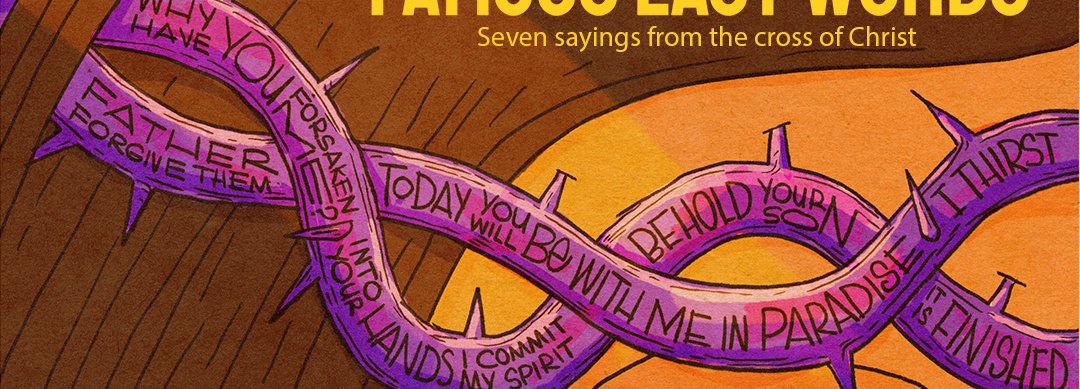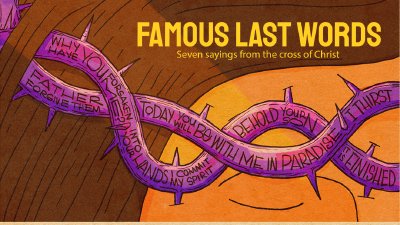


Famous Last Words
"It Is Finished"
March 24, 2024 • Rev. James M. Holland • John 19:28–29
Three words, that is all, but three words that mean everything. How we view the nature of Jesus' work on earth turns on our understanding of these three words. Things can get lost in translation here. For instance, it is finished, is either a cry of finality that either denotes utter futility or absolute victory. When the Memphis Grizzlies entered this year there was high hopes of a deep run in the playoffs. Steven Adams would be back and Ja would be back after twenty-five games. Then the wheels started to fall off. Adams was announced lost for the season just before the first game and then Ja was lost for the season after playing only 9 games. When Ja was lost for the season there was a cry of finality and futility about this season, “we are finished.” In other words what started with promise and hope ended in a cry of finality—we are done! We can’t fix this. On the other hand, we see a different use of this small phrase. The Kansas City Chiefs, trying to repeat as Super Bowl champs, wrestled through a frustrating season, only to rise to the occasion and in the final minute of the Super Bowl won. After the game there was a cry of relief and finality by the players and management. It is finished! We did it, we accomplished the task of winning back to back Super Bowls. What does Jesus mean when he says, It is finished? He is hanging on the cross, abandoned by his friends, convicted by a kangaroo, beaten beyond recognition, helpless, crucified and about to die. Join us Sunday and we will talk about it.
" I Thirst "
March 17, 2024 • Rev. Joshua Smith • John 19:28–29
The burning sand shall become a pool, and the thirsty ground springs of water; in the haunt of jackals, where they lie down, the grass shall become reeds and rushes… For I will pour water on the thirsty land, and streams on the dry ground; I will pour my Spirit upon your offspring, and my blessing on your descendants. - Isaiah 35: 7; 44: 3 It seems impossible to engage the Scripture’s themes regarding thirst and legacy and not be reminded of Dune right now. If you aren’t familiar with the story, the royal Atreides family has left their moisture-soaked home world to govern a sandy wasteland, prized only for a scarce, precious natural resource. They intend to “harness the desert’s power” by learning from an indigenous people captive to prophecies about a future Edenic paradise. This vision has them willing to sacrifice every present comfort to the promise of giving their future generations a heritage of water. Eventually the young messianic Paul Atreides faces a hauntingly familiar crisis: will he exploit the sword of Empire in order to force his Kingdom to come upon these parched dunes as it is in the saturated heavens? Paul’s burden is the similar to the one Frodo carries, almost certain to overtake him: “At their last halt he sank down and said: ‘I’m thirsty, Sam,’ and did not speak again. Sam gave him a mouthful of water; only one more mouthful remained. He went without himself; and now as once more the night of Mordor closed over them, through all his thoughts there came the memory of water; and every brook or stream or fount that he had ever seen, under green willow-shades or twinkling in the sun, danced and rippled for his torment behind the blindness of his eyes.” Frodo and Sam, being mere hobbits, are less tempted by power than would be the gallant Aragorn, future king of Gondor. This story’s messianic figure could be reasonably convinced of the worthiness of his cause and the nobility of his intentions such that even he may have succumbed to grasping, given enough pressure. We modern folks, too, have a great deal of power at our fingertips and in our pockets. And we too live in a sort of wasteland. Who on earth could be strong enough to envision such a paradisal oasis in the midst of hell and yet resist the cool satisfaction of taking up the readiest means for making it so? Who for heaven’s sake would choose to endure the burning sand; the thirsty ground; a haunt of jackals – when hosts of angels, or elven magic, or legions of jihadists, stand at the ready to obey his every command? Whoever he is, he must be thirsting for something more.
Forsaken
March 10, 2024 • Rev. James M. Holland • Matthew 27:46
We are looking at the words of Jesus from the cross. All short, all cries of a desperate dying man on a cross, and all expressing deep need. They are all uttered from a place of total helplessness; they are cries of anguish. But none so much as Jesus’ cry of being completely alone and forsaken. I have experienced much emotional pain, and also physical pain, since the first of the year. First, I lost my father, the man to whom I owe so much, and then I had my knee replaced. A lot of pain and some times of deep loneliness. But one thing I didn’t experience in this extended season of Lent was the feeling of being abandoned and forsaken. No matter where I looked, there were people “with” me – sometimes physically and with hugs and concern, often with food and quick conversations, or some from notes and texts. The pain seems to be bearable; what would unhinge my sanity would be if I was totally alone, having no one with me in the midst of this ordeal. If you want to know how bad sin is, just look at Jesus’ cries of abandonment on the cross. On the last day of Jesus’ life, he watched everyone he loved and poured his whole life into walk away. That in itself would be enough to unhinge his sanity. Yet nothing prepares us for this—Jesus is utterly forsaken by his own Father on the cross. I hope you will join us Sunday as we unpack this. Also, let me remind you that if you have not filled out a pledge card, please take the time to do so. You can either mail them to the church or bring it with you Sunday and put it in the offering plate. To make it even simpler, we will have cards here in case you forget. The deadline for turning your pledge card in is March 17th. I am so excited to see how God will use Our Big Backyard to continue our vision of setting tables for the lonely! I can’t wait to be with you Sunday. It seems like an eternity since I was here, but I am so thankful to be out and about again. Blessings, Jim P.S. Also, don't forget to set your clocks forward a hour tonight for Daylight Savings Time!
"Behold, thy Mother"
March 3, 2024 • Rev. Greg Aydt • John 19:26–27
French philosopher Voltaire (1694-1778) was famously opposed to the church and to much of Christian doctrine. If you want a fun time on Google, try looking up his last words. There are several accounts, many of them quite humorous. One of the more somber accounts says he cried out in desperation to his physician, "I am abandoned by God and man! I will give you half of what I am worth if you will give me six months’ life." The physician replied, "Sir, you cannot live six weeks." Voltaire concluded, "Then I shall go to hell, and you will go with me." For the hopeless, Christ-less, deathbed Voltaire, his last words are sad and selfish. What a contrast to the crucified Messiah. We've been exploring the seven final sayings of Christ this Lent. While his pain is evident, his words from the cross are far from sad and selfish. Instead of retreating into his small world of suffering, he turns his attention to the others around him, offering mercy to the soldiers, pardon for the thief, and compassion to his mother and friend. It's this unbelievable compassion that we'll look at this Sunday. How can an innocent man undergoing brutal torture and crucifixion while bearing the sins of the world possibly look outside himself to feel the pain of others? Let us draw near to the heart of Christ in this passage and there find compassion for our own hurt and the strength to show that compassion to others.
Paradise Regained
February 25, 2024 • Rev. Joshua Smith • Luke 23:39–43
"With Me in Paradise" I rewatched the great animated movie Coco this past week. Studying Jesus’ Famous Last Words in Luke 23, I just couldn’t get the main song out of my head: “Remember Me.” In the film, that refrain is an expression of a major plot point: those who die can live on and revisit us as long as we are faithful to honor their memory. Metaphor becomes reality for a young man who accidentally reverses direction (guided by a certain “Dante”), visiting his great grandfather in the underworld instead. There, everyone is either enjoying the gifts that come with being remembered, or anxiously awaiting the second death that comes when the last candle held for them is extinguished. The theme seems a bit macabre for a family film, but they really manage to pull it off. This idea that existence depends on the attention or memory of another mind was championed by the philosopher George Berkeley in the early 1700’s. He was an Irish Episcopal bishop, very concerned about the materialism arising within Enlightenment rationalism. Some called his idealism silliness because, for example, if a tree falls in the woods and no one is there to hear it, it does, of course, still make a sound! Berkeley’s response was that the only reason there is so much stability in the world is because it is all held together – remembered – in the mind of God. Good comeback. I don’t know if that’s how it all works or not, but I do know that his theory complements the constant prayers in Scripture that God would remember us in death. “For in him we live and move and have our being.” Let’s take this further. A couple of years ago, I read a novel called The Secret Life of Addie LaRue. A young French villager facing an unwanted arranged marriage strikes a Faustian bargain with one of “the gods who answer after dark.” Her request is simple: “I want more time to be young, and I want my life to be my own.” The request is granted, but the awful catch is that she will be henceforth unable to make any lasting impression on anyone she meets for the rest of her supernaturally long life. No matter how notable the exchange, people simply forget they ever encountered her. It’s a tragic but logical implication: because we deeply affect and influence one another’s lives, we belong to one another. Therefore, the only way to belong to one’s self alone is to be alone, and have no effect on anyone else. Which is basically to cease to exist. Fortunately for us, and for that thief on the cross, the Heidelberg Catechism begins right where these philosophical ponderings and pleas for remembrance leave us: Q: “What is your only comfort in life and death?” A: “That I am not my own, but belong, with body and soul, both in life and in death, to my faithful savior Jesus Christ.” - js
"Father, Forgive Them "
February 18, 2024 • Rev. Joshua Smith • Luke 23:33–38
Jim is undergoing knee surgery today. I'm confident we will get the complete rundown and color commentary upon his return, and I’m looking forward to the high drama of it all! What you may not know is that Jim’s not the only one of our pastors who spent some quality time in the hospital this week. Our second-oldest ordained staffer also had quite an eventful time surrendering his aging body to medical professionals. A kidney stone is rarely a life-threatening event. It’s relatively common, with 1 in 10 adults experiencing them. Yet, they say the discomfort is up there with gunshot wounds and labor pains. Listen, I would never suggest that I now know what giving birth feels like. That’s a ridiculous thing for a man to say, and I would never even mention the comparison. It might help instead to put this in strictly scientific terminology for you: it’s like a demon tunnelling through your innards. It occurred to me at one point that I didn’t want my last words to be “We have to find the remote; I just can’t take this Puppy Bowl anymore.” That was right around the time I had turned completely inward and began to feel sorry for myself. Ever since Usher had started singing “Yeah,” I’d been thinking, “Oh no.” By the beginning of overtime, I was vomiting in the ER waiting room (pro tip: you get seen faster that way). Seven or so hours later, we were still struggling to manage the pain and they were talking about admitting me to the hospital. Many of you know how fraught these moments are. You are hurting and utterly helpless. You aren’t thinking clearly, but you’re being asked to make some very expensive decisions. You’re often experiencing some sort of post-traumatic triggering. You’re worried about all the important things that are now completely out of your hands. Fortunately, I had been with my Community Group when it happened, and my family and friends are incredible. I was so well supported. But that didn’t keep me from being anxious. And pouty. Paul calls our sufferings a kind of fellowship. Yet, when I look at the way Jesus suffered and the kinds of things he said in his hours of agony, I don’t feel like I have much overlap there at all. I had been reduced to the version of myself that can’t fake strength or nobility. I was breathing curses and looking for any way out. I doubt that when my actual time comes, I will be one to die with all the serene dignity of a Jedi. But Jesus doesn’t look on the guys writhing next to him, nor the shocked onlookers, nor the mocking assailants, nor even me, with smug superiority in his perfect suffering. In his distress, Christ, too, is concentrated to the bare essentials of who and what he is: the God who loves and reaches toward us at our most pitiful. And I want to hang on every word that proceeds from that mouth. So, I hope you can join us this weekend as we begin our Lenten series, Famous Last Words: The Sayings of Christ from the Cross.


